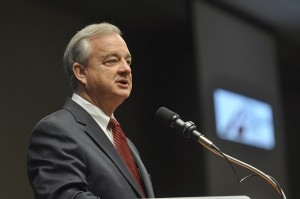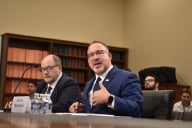You have /5 articles left.
Sign up for a free account or log in.

Texas A&M University System Chancellor John Sharp
Texas A&M University
When a new president takes the helm of a university, it’s common for there to be turnover among the leadership ranks. But by asking top administrators at Texas A&M University's flagship campus to submit letters of resignation before a new president even begins his term, the A&M system's chancellor is taking transition turnover to a new level of formality and breadth.
In a letter, Chancellor John Sharp requested that vice presidents and advisers to the president of Texas A&M's College Station flagship submit their letters of resignation to incoming President Michael Young, the former president of the University of Washington. Sharp says he wants to institute the practice systemwide, making it standard operating procedure that the upper ranks at each of the A&M universities and the system office offer to resign when a new president or chancellor comes in.
Even without the resignation letters, Young has the right to dismiss administrators as he sees fit. At most universities, vice presidents and other executives are at-will employees and serve at the behest of the school’s leader.
“You don’t get to keep the job even though you may not be compatible with the desires of the new president,” Sharp said. “No one expects the new president to choose them just because they’ve been working there before. These are very high-level positions. These are not positions that are lifetime jobs.”
The letter, he says, formalizes an already existing practice of new presidents culling their leadership team. Sharp said about 15 vice presidents and advisers have been asked to submit letters.
“It’s easier on the president. It causes a lot less conflict,” he explained. “This makes sure that everyone understands the rules of the game.”
While leadership changes when a new president assumes office are common -- often universities will delay filling open administrative positions until a new president arrives, for example -- Sharp’s preemptive request for resignation letters of the full cabinet-level staff appears to be rare in today’s higher education landscape.
The request could put employees on edge during a time when a smooth transition is necessary for the incoming president’s success, according to Daniel J. Hurley, associate vice president for government relations and state policy at the American Association of State Colleges and Universities.
“Senior administrators understand they are at will. To formalize the process by submitting a letter of resignation is awkward,” he said. “To come in and ask an entire cadre of senior administrators to submit their resignation, and maybe it will be accepted and maybe it won’t, is terribly unsettling for the institution at large and certainly for the affected individuals.”
Robert Smith, vice president of CBT University Consulting and a former provost of Texas Tech University, said that preemptively requesting resignation letters is common in government and business and even college-level sports programs, but not in university administration.
“We live in a different world in academia. What happens in academia is largely based on trust,” he said, calling Sharp’s request for resignation letters unfortunate and tantamount to treating administrators in a lockstep manner. “Frankly, in that environment this kind of approach, I believe, will be perceived as being offensive.”
Sharp said the letters will make it easier for the president to build an administrative team.
“Instead of that president having to call you in and say ‘You’re fired,’ the president will simply say ‘I’ve accepted your resignation,’” Sharp said, adding that in previous transitions provosts at A&M have submitted letters of resignation out of deference to a new president.
“You may have trouble recruiting world-class presidents who don’t get to pick their own staff,” he continued. “This is to make sure the president of the university gets to pick the team that judges his or her success.”
Once Young assesses his team, he may well refuse most of the letters, Sharp said.
In the letter, Sharp asks all executive and senior vice presidents and special advisers and assistants to the president to submit their resignation letters, with open-ended dates, to Young on May 1, 2015, the day Young takes office. In their letters, administrators can ask to join the faculty or separate from the university if their resignation is accepted. Sharp cited an existing system policy that allows the chancellor to dismiss or reassign vice presidents, deans, deputy directors and associate directors. He has requested that Young determine whether to accept the letters no later than May 1, 2016.
Sharp said Young did not request the letters of resignation.
Typically in university governance, a system head hires and fires the campus presidents, but otherwise stays out of personnel decisions -- at least officially -- on the campuses, leaving those choices up to the presidents. Sharp's mandate could be seen as involving the chancellor in campus employment decisions, raising questions about how independently the presidents will be able to operate. Sharp says he won't have a role in saying which administrators stay or go, decisions he says lie with the president.
Jan Greenwood, an executive search consultant who specializes in higher education and is president of Greenwood/Asher & Associates, said that giving new presidents latitude to fire and hire vice presidents is essential to those presidents realizing their vision for an institution.
“The basic rule of leadership and management is that if the person who is hired for the position cannot build their own team, they can’t be held accountable for the results that the team gets,” she said. “When you’re talking about a top administrator, you have a rather intense level of accountability that comes into play.”
Greenwood said that while most new presidents ask for resignations after watching an administrative team at work for a few months, she has known of cases when resignation letters were requested of administrators from the outset of a president’s tenure. Search consultant Jamie Ferrare, managing principal of AGB Search, said the practice was more widespread a few decades ago but is less common today.
“It’s a little surprising, a little different, but it gives the new president a great deal of flexibility,” he said. “It sends a message that we’re going to do things a different way right now, and we hope you’re on board with that.”
While giving the president flexibility, the request, if made a policy at A&M universities, could hinder the retention and recruitment of administrators, according to John Moore, a consultant who works with university leaders and is a former president of Indiana State University.
“I would not advise my clients to adopt such a practice. It breeds a level of insecurity and uncertainty and could result in premature entering into the job market for those administrators, contributing to a lack of continuity and momentum at the institution,” Moore said. “Everybody knows they serve at the pleasure of their boss. That’s very different than submitting a formal letter of resignation. What are you supposed to do, just sit around and hope that you aren’t let go? No, you’re going to get in the market and start looking.”
On the other hand, requiring resignation letters makes transparent an already existing reality: that the jobs of top administrators depend on the assessment of an institution’s president.
“People taking these high-level positions need to know they’re accountable and these positions are not tenured,” said James McCormick, former chancellor of the Minnesota State Colleges and Universities and the Pennsylvania State System of Higher Education and a presidential search consultant.
Meanwhile, as new presidents look to build their leadership teams, McCormick says they also need to be cognizant of the mood among their staff.
“They need to be thinking about the morale of those key individuals,” he said. “Do they feel, in the end, that there’s some fairness in the process?”








